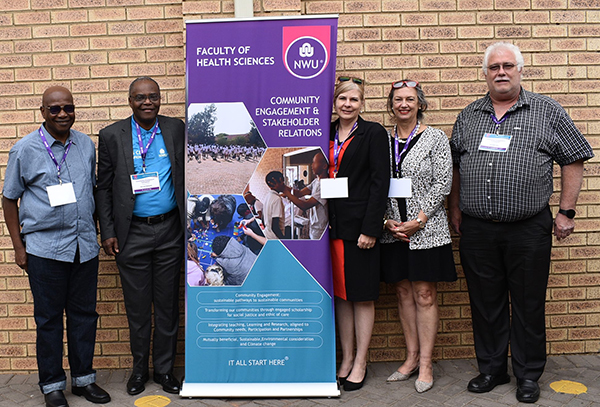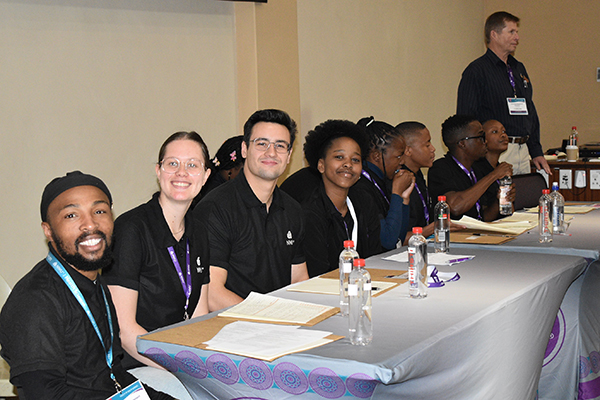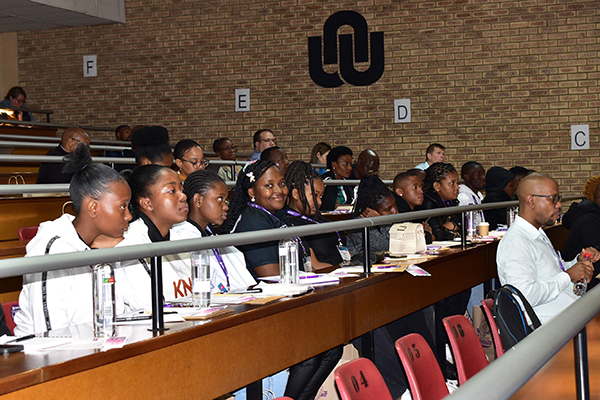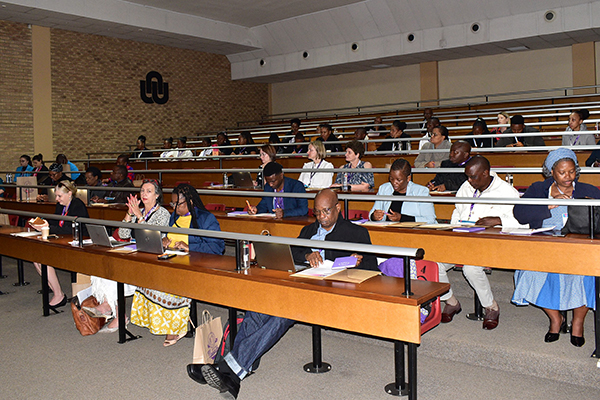The North-West University’s (NWU’s) Faculty of Health Sciences hosted its first Community Engagement Colloquium on the Vanderbijlpark Campus on 2 and 3 October.
The purpose of this colloquium - titled "Health sciences and partnerships for sustainable communities" - was to bring together academics, practitioners, and community members to start a conversation about the ways in which they can work together to improve health outcomes for communities.
Prof Linda du Plessis, deputy vice-chancellor for planning and Vanderbijlpark Campus operations, welcomed delegates to the colloquium and wished them successful engagements.
Prof Sonia Swanepoel, deputy vice-chancellor for community engagement and Mahikeng Campus operations, shared a message of support, highlighting the importance and relevance of linking community engagement activities to the United Nations Sustainable Goals (UN SDGs).
Besides staff and students from the NWU, more than 70 delegates from various organisations and institutions attended and participated in the successful and engaging hybrid colloquium. Among those that attended were stakeholders from the National Research Foundation, the North West Provincial Department of Health, Stadt Primary School, and the universities of Venda, Pretoria, Cape Town and Western Cape. International delegates from the USA, Australia, United Arab Emirates, Germany, Nigeria, Ghana, Botswana and Lesotho joined virtually.
During the overview and introduction, executive dean of the Faculty of Health Sciences, Prof Awie Kotze, encouraged participants to share their unique perspectives, experiences and expertise. “This colloquium is a safe space for open and respectful discussion, where every voice matters. By harnessing our collective wisdom, we can find solutions to the most pressing challenges facing our communities,” he said.
Experts and speakers address topics related to the five sub-themes aligned with the UN SDGs. These topics included collaboration in enhancing community well-being through physical activities, fostering positive relationships and community engagement, artificial intelligence and integration of transdisciplinary approaches to health promotion, intellectual property, commercialisation and engaging community members and stakeholders in developing holistic health programmes.
The highlight of the second day of the colloquium was a student debate on professionals working together to solve real-world community problems using the UN SDGs as a framework.
What clearly came forth from the discussions was that, to improve health outcomes, not only individual health behaviours but also the social determinants of health need to be addressed. Participants came to the conclusion, that by working together with other institutions and forming mutually beneficial partnerships, the NWU can identify and implement interventions that improve individual health and foster healthy environments for communities.
“By understanding and addressing the social determinants of health and implementing sustainable practices, we can work towards a future where everyone has the opportunity to lead a healthy and fulfilling life while preserving our planet for future generations,” said Prof Ushotanefe Useh, deputy dean for community engagement and stakeholder relations in the Faculty of Health Sciences, and a research professor in the Lifestyle Diseases research entity.

At the Faculty of Health Sciences’ first Community Engagement Colloquium are from the left emeritus Prof Seyi Ladele Amosun from the Faculty of Health Sciences at the University of Cape Town, Prof Ushotanefe Useh, deputy dean for community engagement and stakeholder relations in the Faculty of Health Sciences, Prof Linda du Plessis, deputy vice-chancellor for planning and Vanderbijlpark Campus operations, Prof Sonia Swanepoel, deputy vice-chancellor for community engagement and Mahikeng Campus operations, and Prof Awie Kotze, executive dean of the Faculty of Health Sciences.

Students in psychology, social work, nursing, pharmacy, human movement sciences, and occupational hygiene take part in a debate on professionals working together to solve real-world community problems using the United Nations Sustainable Development Goals as a framework.


Delegates at the Faculty of Health Sciences’ first Community Engagement Colloquium
